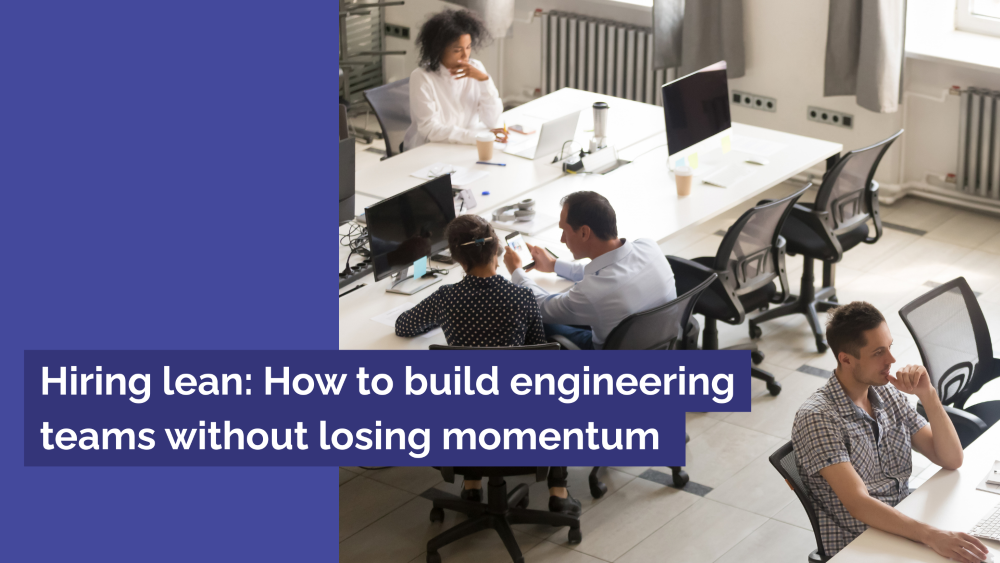Hiring lean: how to build engineering teams without losing momentum


There’s a difference between thoughtful, careful recruitment and reactive cost-saving. When pressure builds on engineering teams, it’s tempting to reduce roles quickly without assessing what the team actually needs. This rarely ends well. Removing someone from the Engineering team without a plan often leads to knowledge gaps, blocked projects or slower delivery.
To avoid this, many of our clients work with us to reconsider how each hire contributes to long-term goals.
Often it’s possible to redesign engineering roles so they grow capability, not just plug holes. Sometimes that means recruiting earlier-career candidates who can learn quickly, bring fresh thinking and take work off senior engineers’ plates.
What can go wrong without the right balance
Cutting head count can save costs in the short term and in some cases smaller teams can be fast-moving, but they also carry more risk. When only a few people hold deep technical knowledge, momentum depends heavily on them. If they leave, take time off or shift focus, delivery slows or stops. With little room for mentorship, teams lose the ability to train new hires or bring in junior talent.
We’ve seen cases where a senior engineer is hired to “do it all” but ends up stretched too thin. They’re writing code, mentoring, managing backlogs and trying to shape architecture—all while onboarding others. It’s not sustainable, and people burn out.
Junior engineers are an asset, not a luxury
Many companies hold off on hiring juniors until they’re “ready.” But that readiness often never comes. In practice, bringing in early-career engineers doesn’t have to be a risk. With the right support structure, they grow quickly and add real value.
They also improve team health. When senior engineers spend less time on simple fixes or low-impact tasks, they can focus on more strategic work. Meanwhile, newer team members gain confidence and start contributing meaningfully. The result is better engagement across the team and a clearer pathway for internal growth.
Avoid reactive decisions that stall growth
It’s easy to focus only on the next project or quarter. But tech hiring shouldn’t just solve what’s urgent. The most common issues I see come from short-term thinking: skipping important hires because they don’t feel critical now, delaying replacements for leavers or relying on temporary fixes like contractors without internal continuity.
These choices often look efficient at first, but the hidden cost shows up in slower onboarding, low morale or missed delivery milestones. Sustainable recruitment means hiring with future roles in mind—even if that means fewer but more strategic hires.
How to approach team design differently
Leaner teams aren’t necessarily the problem here. Lack of planning is. A strong team doesn’t need to be big, but it does need the right mix of experience, curiosity and adaptability. Building that balance takes more than just reviewing CVs. It means understanding how people grow, where the team has blind spots and who’s ready to take on more responsibility.
From a recruitment strategy perspective, it’s worth revisiting role definitions regularly. What worked six months ago may no longer fit. Talk to your recruiters about the potential in each hire—not just what they’ve done, but what they’re ready to learn. This mindset helps companies build depth without growing headcount.
Rethinking what it means to stay lean
The goal isn’t fewer people. It’s better decisions. With the right hires and enough support, small engineering teams can scale systems, mentor newcomers and keep up with changing demands. But that only happens when hiring is guided by more than urgency.
Our advice is this: avoid shortcuts. Invest in talent that grows with the business. Look beyond the next release cycle. Recruit for impact, not just output.
Troi Search works with businesses across the UK and Europe to help them make cost-effective and impactful hires and create future-proofed teams that drive growth. If you would like to find out more about how we can help you recruit the best engineering talent on the market get in touch with us to find out more.